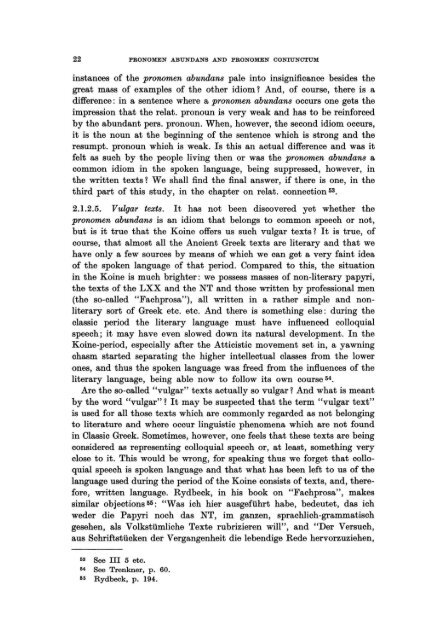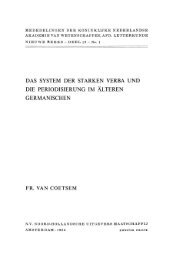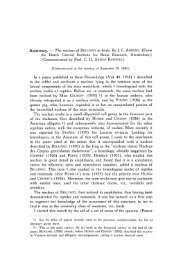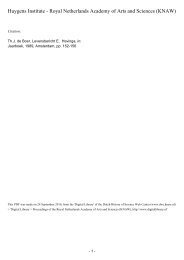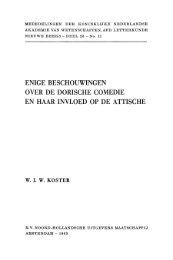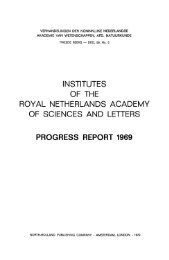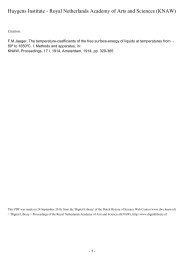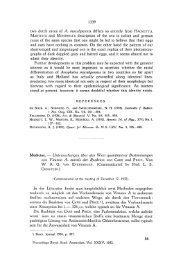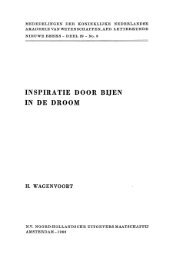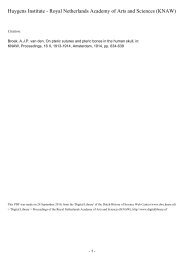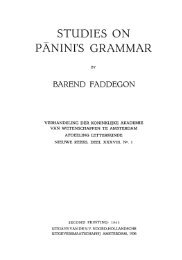Pronomen Abundans and Pronomen Coniunctum. A ... - DWC
Pronomen Abundans and Pronomen Coniunctum. A ... - DWC
Pronomen Abundans and Pronomen Coniunctum. A ... - DWC
Create successful ePaper yourself
Turn your PDF publications into a flip-book with our unique Google optimized e-Paper software.
22 PRONOMEN AlIUNDANS AND PRONOMEN CONIUNCTUM<br />
instances of the pronomen ahundans pale into insignificance besides the<br />
great mass of examples of the other idiom? And, of course, there is a<br />
difference: in a sentence where a pronomen abundans occurs one gets the<br />
impression that the relat. pronoun is very weak <strong>and</strong> has to be reinforced<br />
by the abundant pers. pronoun. When, however, the second idiom occurs,<br />
it is the noun at the beginning of the sentence which is strong <strong>and</strong> the<br />
resumpt. pronoun which is weak. Is this an actual difference <strong>and</strong> was it<br />
feIt as such by the people living then or was the pronomen ahundans a<br />
common idiom in the spoken language, being suppressed, however, in<br />
the written texts? We shall find the final answer, if there is one, in the<br />
third part of this study, in the chapter on relat. connection 53.<br />
2.1.2.5. Vulgar texts. It has not been discovered yet whether the<br />
pronomen ahundans is an idiom that belongs to common speech or not,<br />
but is it true that the Koine offers us such vulgar texts? It is true, of<br />
course, that almost all the Ancient Greek texts are literary <strong>and</strong> that we<br />
have only a few sources by means of which we can get a very faint idea<br />
of the spoken language of that period. Compared to this, the situation<br />
in the Koine is much brighter: we possess masses of non-literary papyri,<br />
the texts of the LXX <strong>and</strong> the NT <strong>and</strong> those written by professional men<br />
(the so-called "Fachprosa"), all written in a rather simple <strong>and</strong> nonliterary<br />
sort of Greek etc. etc. And there is something else: during the<br />
classic period the literary language must have influenced colloquial<br />
speech; it may have even slowed down its natural development. In the<br />
Koine-period, especially aftar the Atticistic movement set in, a yawning<br />
chasm started separating the higher intallectual classes from the lower<br />
ones, <strong>and</strong> thus the spoken language was freed from the influences of the<br />
literary language, being able now to follow its own course 54.<br />
Are the so-called "vulgar" texts actually so vulgar? And what is meant<br />
by the word "vulgar" ? It may be suspected that the term "vulgar text"<br />
is used for all those texts which are commonly regarded as not belonging<br />
to literature <strong>and</strong> where occur linguistic phenomena which are not found<br />
in Classic Greek. Sometimes, however, one feels that these texts are being<br />
considered as representing colloquial speech or, at least, something very<br />
close to it. This would be wrong, for speaking thus we forget that colloquial<br />
speech is spoken language <strong>and</strong> that what has been left to us of the<br />
language used during the period of the Koine' consists of texts, <strong>and</strong>, therefore,<br />
written language. Rydbeck, in his book on "Fachprosa", makes<br />
similar objections 55 : "Was ich hier ausgeführt habe, bedeutet, das ich<br />
weder die Papyri noch das NT, im ganzen, sprachlich-grammatisch<br />
gesehen, als Volkstümliche Texte rubrizieren will", <strong>and</strong> "Der Versuch,<br />
aus Schriftstüoken der Vergangenheit die lebendige Rede hervorzuziehen,<br />
53 See III 5 etc.<br />
54 See Trenkner, p. 60.<br />
55 Rydbeck, p. 194.


